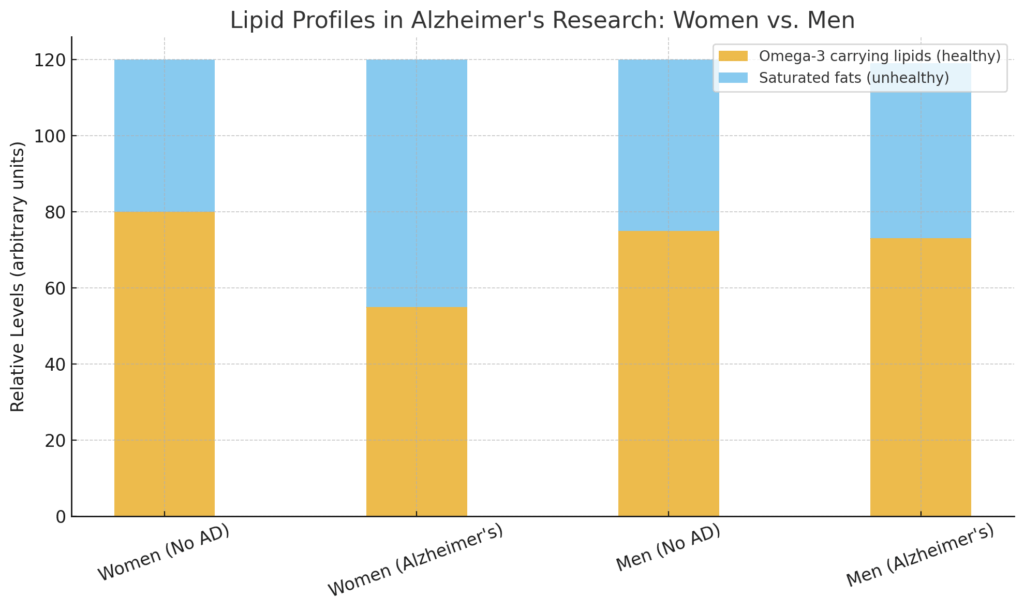Omega-3 and Women’s Alzheimer’s Risk
Women are at a higher risk for Alzheimer’s, but the reasons have remained elusive. A new study points to an important clue: women with Alzheimer’s have lower levels of healthy omega-3–carrying fats in their blood, while men with the disease do not show the same pattern.
A Surprising Lipid Pattern in Women with Alzheimer’s
Researchers analyzed blood samples from more than 800 people, including both men and women with and without Alzheimer’s. They found that:
- Women with Alzheimer’s consistently had lower levels of unsaturated fats that carry omega-3 fatty acids, and higher levels of saturated fats considered unhealthy.
- Even more striking, scientists identified 32 specific lipid molecules tied to Alzheimer’s in women. In men, none of these lipid markers were present. This points to a sex-specific biological pathway that may help explain women’s greater vulnerability.
What This Means — and What It Doesn’t

The results suggest that omega-3s might play a protective role in women’s brain health. Still, this does not prove that low omega-3 causes Alzheimer’s. It remains unclear whether the drop in healthy fats is a driver of the disease, or simply a result of it.
Amazon: Prevent Alzheimer’s / Dementia
- Organic Turmeric Powder
- Omega 3 Supplements
- Diet & Alzheimer’s
- Prevention Guides
- Turmeric Curcumin Supplement
FREE! Weekly Diet Tips:
Nevertheless, these differences open new doors for research into prevention and treatment that may need to be tailored specifically to women.
The Road Ahead: Clinical Trials and Prevention
Researchers are now calling for clinical trials that focus on women, including younger participants. The goal is to test whether increasing omega-3 intake, either through diet or supplements, can slow or prevent Alzheimer’s progression. More diverse study populations will also help confirm whether these lipid patterns are widespread.
Practical Takeaway
While we don’t yet have Alzheimer’s-specific guidance, one thing is clear: omega-3 fatty acids are vital for overall brain and heart health. For women especially, ensuring adequate intake may offer an added layer of protection.
Good dietary sources include:
- Fatty fish such as:
- Salmon,
- Sardines,
- Trout, and
- Mackerel.
- Plant-based options such as:
- Chia seeds,
- Flaxseeds, and
- Walnuts.
For those who struggle to get enough from food, omega-3 supplements (such as fish oil or algae-based capsules) are widely available. As always, women should talk with a healthcare professional before starting any new supplement routine.
Call to Action
If you are a woman concerned about memory health, consider making omega-3s a regular part of your diet. Share this information with your loved ones, and speak to your doctor about whether increasing your omega-3 intake through foods or supplements could benefit you.
Small steps today may add up to long-term protection for your brain.











